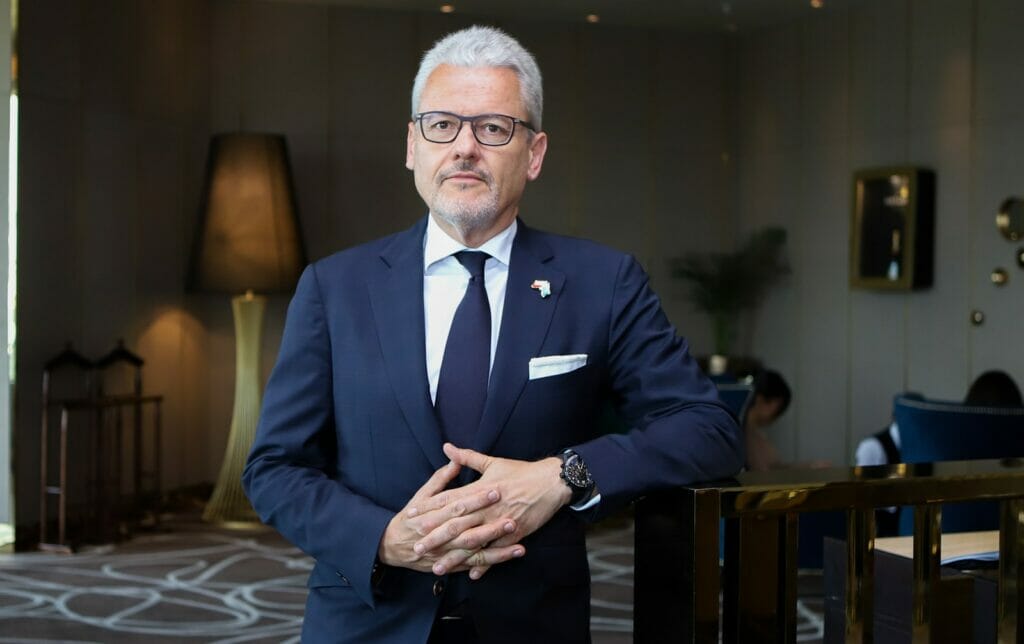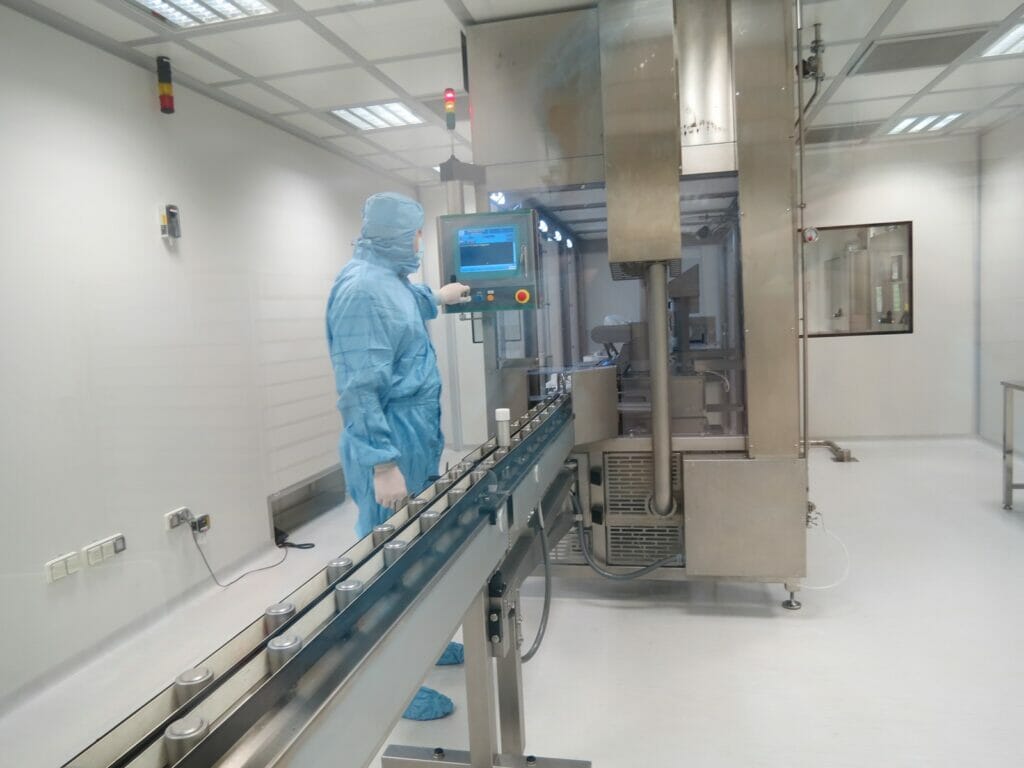
SANTO is a leading pharmaceutical company in Central Asia and part of the international pharmaceutical group Polpharma. In an interview with Kursiv, CEO of the Polpharma Group Markus Sieger shared his vision about how the industry has changed after the COVID-19 pandemic, what drugs Kazakhstani doctors are used to use now and what drugs they will use for medical treatment in the future.
— SANTO has been part of the Polpharma group for twelve years, what has changed since then? Has the production of drugs expanded?
— We started investing in SANTO in 2011 and since then have transferred to our Kazakhstani colleagues all the best practices we had in our pharmaceutical group. Today we run seven production sites and five laboratories, including one in Shymkent. We also have trained the company’s personnel to ensure they can comply with our quality standards and manufacturing process for new drugs. SANTO’s portfolio already includes more than 240 types of drugs, and this number is going to go higher. Among our key priorities are cooperation with Kazakhstani doctors, professional training and development and expansion of production. We have also started exporting our products abroad, mainly to Uzbekistan and Kyrgyzstan. By now, about a third of our production capacity is working with exports from our hub in Kazakhstan to other countries in Central Asia.
— What are the current goals of the global pharmaceutical industry?
— We are living in an era when patients are central figures in the pharmaceutical industry. After experiencing the COVID-19 pandemic, more and more people are realizing that health is the most valuable asset. There is a growing demand for a healthy lifestyle, and we are eager to help people to live healthy lives in a healthy world.
We are focused on preventing diseases, maintaining good health and ensuring that people are satisfied with the quality of their lives. We are developing and offering supplements, vitamins and other medicines to support people’s health and treat chronic conditions. At the same time, our products are quite affordable to patients.
We believe that the domestic production of drugs will contribute to the provision of decent treatment for everyone. So far, even though the pandemic is over, many people still feel weak and have an increased need for vitamins, supplements and medicines. We have committed ourselves to supply the demand for these products to help people regain their health and well-being.
— Why did you decide to invest in Kazakhstan?
— We are a large company headquartered in Poland. We have chosen this market for several reasons. First, there is a good outlook for development and demand for medical services here in the region. We believe that our philosophy and approach to medicine meet the needs of such countries.
We believe in the further growth of this market; therefore, we are investing a significant amount of money in Kazakhstan, including the SANTO project. We’ve already invested $108 million and will invest an additional $30 million by the end of 2025.
We are completing the construction of our most up-to-date quality lab and R&D center, which are going to be equipped with advanced technologies and devices. In this regard, our goal is to make our lab and manufacturing meet European standards.
This project, developed with a long-term perspective in mind, is going to be completed by 2025. Once it is completed, we will be ready to expand our exporting capabilities. We are striving for innovation and the production of high-quality products in order to provide our partners within the healthcare system and patients with the most advanced medical solutions.

— You’ve just mentioned the pandemic. Has the pharmaceutical industry recovered from the pandemic or does it still struggle with problems?
— During the COVID-19 pandemic, we faced serious problems with the international supply chains of various goods. You probably remember a situation that happened just a couple of months ago in Germany, when local authorities reported an acute shortage of cough syrup for children. This is just another example of why the presence of an efficient supply chain is so important for our industry.
Our industry performed quite well before the pandemic. During the crisis, our company worked around the clock and each employee did their best to ensure free access to necessary drugs.
We need to remember how fragile the supply chain can be. This is why it is important to invest in domestic production. It is crucial to avoid potential problems with the supply of drugs. Our goal is to ensure that we produce as many drugs here in Kazakhstan as we can. We are quite serious about it as we believe that this is a very important decision.
— What products do you think are critical for local production?
— Antibiotics. This type of drug is one of the key medicines. However, we can’t rely on just this type of drug because microbes can get used to it, which is not good for people’s health. You have to be extremely careful with antibiotics. In this regard, products for anesthesia, as well as drugs for the treatment of cardiovascular diseases, are also highly important. The manufacturing of such products requires special attention, as they belong to key areas in medicine.
— What does the healthcare system need now and what can happen in the industry in the future?
— I think that our company is doing well in terms of digitalization. It’s very important for us as a business to keep in touch with the help of our medical applications. We are keen on using digital solutions to provide people with the necessary information about our drugs and to improve communication with doctors. Let me give you an example. Many patients with cardiovascular diseases stop using their prescribed medications after twelve months. They do not fully understand the importance of taking these medications properly. As a result, they can suffer from the development of chronic conditions or heart attacks over time.
In Poland, we have developed a program that combines education and digital apps. This program is aimed at motivating patients to take medications properly. Also, it gives feedback to doctors. An easy-to-use app can help a large number of people take their medications on time and better understand why this is so important.
We are striving to use technologies that combine education, information and real-life application of drugs. We have many goals, but the paramount one is to take into account the needs of patients in all our production and organization processes. We use modern methods such as the concept of the «digital twin,» when all manufacturing processes are fully controlled by artificial intelligence. AI plays an important role in our technologies. It is important to use all available tools and ensure our projects meet the needs of the patients.
— Can you tell us about the vision and goals of the Polpharma Group in Kazakhstan?
— There are three key elements that should be taken into account. First, we are a pharmaceutical group with an annual turnover of €1.2 billion and 7,000 highly qualified employees. Secondly, we are developing a seven-year plan in which the growing market of Central Asia is going to play a particular role.
Most importantly, the headquarter where many important decisions are made is located in Kazakhstan. We use this as a leverage to increase our productivity. We are the leading pharmaceutical company in Kazakhstan and we are proud of it. Now, our goal is to become stronger and more technology-savvy.
— What collaborations and partnerships have you established in Kazakhstan and how do they affect the healthcare system?
— The pharmaceutical industry is open to cooperation. In this regard, we’ve established a partnership with a Canadian company to boost our production and import-export of our products. In Kazakhstan, we are currently cooperating with several large international companies that want to launch pharmaceutical production here.
The plan is to expand our business and cooperate with other countries. We are very satisfied with our employees in Kazakhstan. More than 60% of them have higher education and high abilities. For example, when we need spare parts for our machines, we make them with the help of 3D printers.
I’ve noticed long ago that employees in Kazakhstan are tech-savvy and always strive for new achievements. I’ve been working in the industry for 29 years and I think it’s safe to say that Central Asia achieved big progress in terms of overall development thanks to the local people, who constantly pursue professional growth and self-improvement. It is a great honor for me to work in this region.

— What opportunities does SANTO have in Kazakhstan and what is it planning for the near future?
— When we talk about the pharmaceutical industry, this is the area I can talk about as an expert. President Tokayev announced that the government wants pharma products to be produced domestically and I think that it is necessary to invite foreign businesses for investments or to collaborate with local companies.
There is a huge potential for the localization of production, especially when it comes to the pharmaceutical sector. We are planning to invest an additional $30 million, and this is just the beginning. The group is always in the process of investment and development. We have never ever tried to save money when it comes to investments in the development of new products and training personnel because we believe that it’s the most valuable investment. If there are no motivated employees, you never achieve big success. That is why we focus on products, people and the combination of all of these elements. In this regard, Kazakhstan has great potential.
— You mentioned that you are quite happy with your employees. How do you support the local economy: through the creation of new jobs, the transfer of new technologies or the development of skills?
— We are actively investing in the development of the production of drugs, which contributes to the national GDP. We pay taxes and also create jobs for thousands of employees. In addition, another 4,000 people depend on our activities. This is one aspect of the issue. And of course, our exports have an important impact on the economy as they open new opportunities.
We are promoting new technologies, expanding access to information for our employees and giving lectures at universities. For example, we are going to talk soon about digitalization in Shymkent.
We maintain close cooperation with universities. For example, since we have advanced laboratories, we invite university students to come to visit our production facilities. It is important to understand how to provide people with the best training, given that our organization has a range of certain characteristics.
Concerning technologies, we are going to launch an online project in three to four months, in which we will present a new technology for the production of pills. We always strive to introduce new products and share information about them. We pay special attention to the development of drugs for the treatment of diabetes. We want them to be produced locally. After all, these are special drugs and it is very important to talk about them and educate people, especially in the context of Kazakhstan.
— How has the company’s strategy changed during the pandemic in Kazakhstan and other markets?
— We were forced to learn how to adapt to the changing business environment during the pandemic. We switched to remote work and increased production volumes. When a business environment is constantly changing, it is necessary to be flexible and keep moving forward. We realized that no matter if we were at home or at work, the work must be done. However, the supply chain has changed. Everything was simple before the pandemic. You placed an order and then received it from India or Germany in one week. Now, we have to make our order in advance and wait up to three months, which causes many problems in the production cycle.
I believe that we need to start looking for new ways of interacting with doctors. We run a set of educational programs for doctors. We develop new programs and update the existing ones because we believe that it is very important. We facilitate prominent professors and experts, leaders in their fields of knowledge, to share their expertise with others. It is much easier to organize such educational events these days as doctors prefer more flexible formats of lectures rather than just attending a lecture in person.
— Do you think a hybrid format of work is more efficient for businesses?
— There are three categories of people, each of which plays a different role in our organization. The first category is our colleagues on the production site, who have to stay on the site in person. The second category is digital specialists who work online. All they need is access to laptops and other electronic devices. The third category includes employees, whose work combines elements of the first two categories.
I personally travel a lot. For example, I live in Switzerland but spend three days a week in Amsterdam. Regular business trips are an integral part of my work. However, even if you have to constantly travel, you need some structure and organization in your work.
It is important to hold meetings to discuss important issues and make decisions. Without a clear structure and organization, there can be no stability, and without stability, nothing can be achieved. When you talk to someone via video call, you can miss some important signals in the behavior of your interlocutor that you probably would have noticed during a face-to-face meeting. Therefore, it is important to be able to meet with your team members in person regularly.
As a leader, I am responsible to my employees and should be a role model for them. I never ask employees to do something that I can do myself. We have to support each other within the team and see eye to eye.












